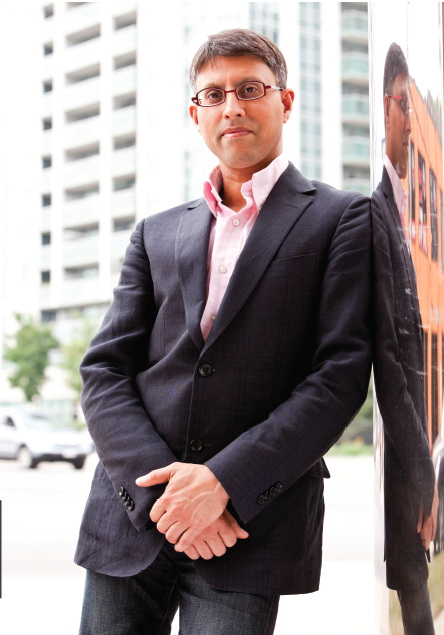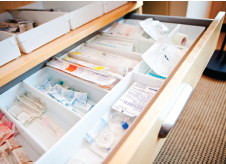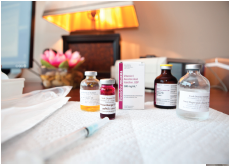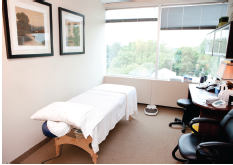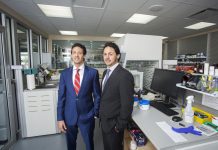DR AKBAR KHAN, md
Medicor Cancer Centres
As IHP continues to showcase integrated medical doctors as cover features, several trends emerge with regards to the manner in which an MD generates an interest in implementation of integrative therapies. Sometimes the MD entered their medical training with an already existing passion for natural therapeutics. Often the decision stems from patient inquiry leading to literature- based research of the field. Dr Akbar Khan, MD, represents a novel and exciting avenue through which, in this case, a conventionally- trained family physician has come to embrace a broad array of integrative techniques; he witnessed first hand the immense magnitude of safety and efficacy of the practice.
This 1992 graduate of the University of Toronto School of Medicine describes sharing an impression of integrative medicine of most allopathic doctors in Canada; skepticism and a belief that integrative practices were lacking in efficacy. But a trend that has existed for some time, and continues to grow at an exponential pace, is patient enquiry regarding use of natural medicines. Still skeptical, Dr Khan decided to have an ND offer services through his private clinic in 2006. “I didn’t expect much in the way of benefit, but I figured it would be better to supervise the use of such medicines rather than have patients finding them on their own, likely to not inform me of what they were using” describes Dr Khan. In a very short period of time, Dr Khan’s impression of natural medicines for cancer management underwent a 180 degree turn; today, Dr Khan is a vocal advocate of the benefits of natural medicines for cancer management.
Dr Douglas Andrews, ND, is the naturopathic doctor of the Medicor Cancer Centres team. The ability to implement the full extent of naturopathic training in a centre focused on cancer management is a rare luxury in Canada. Having the support of the supervising physician to apply required monitoring, and to have access to world- class progression markers is equally inviting. The Medicor Cancer Centres team has provided a benchmark example for the simplicity with which MD and ND can coexist and deliver the ultimate goal of healthcare; improved patient outcomes through collaboration.
“I learned through observation…” continues Dr Khan. “Pretty soon I was tracking down human trials and preclinical evidence of how these substances work, which ones work, which ones have interactions to be aware of”… “I was amazed by how many problems conventional medicine has no answer for yet natural medicines provide safe, effective, and inexpensive solutions for… take neuropathy for example”…
Dr Khan is quick to highlight an important factor in assimilating evidence of natural medicine for application in an oncology practice: consideration of quality of available evidence. Why is it difficult to find good quality evidence of these safe, effective, and inexpensive medicines? Why are journals not full of Phase II and III clinical trials of natural medicines among patients with cancer? The answer is quite simple. It has nothing to do with safety, nor efficacy. It’s all about $$$. “There is no proprietary ownership of the molecules or substances in question. Who is willing to spend the dollars to research these substances when after the years of effort and cost there is no profit to be made?” describes Dr Khan. Practitioners of integrative medicine have been frustrated by this “profit first” model of medicine for decades. Unexplainably, it seems to carry more weight coming from a conventionally- trained practitioner.
Intravenous vitamin C was the first integrative therapy to catch Dr Khan’s eye. He was highly skeptical of its ability to deliver any outcome of significance, but decided a sufficient evidence- base existed to establish it was safe and unlikely to interact with the conventional medicines being applied. Now a vocal advocate for the intervention, Dr Khan simply says “it works!” “Patients have more energy, less nausea, and we have clearly witnessed it having no interaction of concern with the conventional medicines we use”.
Dichloroacetate (DCA) is another medicine Dr Khan praises his affiliation with integrative practitioners for being introduced to. While a synthetically- created prescription medication, it is not considered for application in patients with cancer among circles of conventional practitioners. Dr Khan liberally uses the medicine, supported by highly impressive evidence of clinical utility. This important medicine however produces peripheral neuropathy in a large percentage of patients who implement it. In conjunction with Dr. Dong Andrews, ND and Dr Jill Shainhouse, ND, a protocol of natural medicines was created for coadministration with DCA in an effort to prevent the neuropathy that accompanies the use of the drug. Through combining R-alpha lipoic acid, acetyl- L- carnitine, and benfotiamine, amazing outcomes in prevention of DCAinduced neuropathy have been achieved. Dr. Khan is also using the same cocktail of natural medicines with excellent results in treating patients with pre-existing chemo-induced neuropathy.
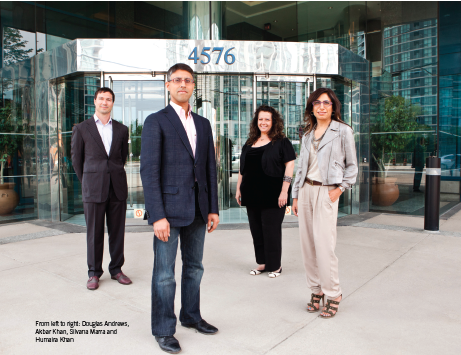
Akbar Khan, Silvana Marra and
Humaira Khan
Dr Khan describes with frustration the lack of interest displayed by conventional practitioners for safe and effective solutions simply because they come from the realm of natural medicine. “My greatest concern is helping patients. If it works, who cares where it comes from? Prior to developing the neuropathy protocol, our best answer was analgesic medication for painful neuropathy. The combination of three simple, inexpensive, and safe natural medicines allows us to liberally apply an effective anticancer agent that otherwise we would be forced to use very sparingly”.
Tetrathiomolybdate (TM) is another drug frowned upon by most conventionally- trained oncologists that Dr Khan has come to rely on heavily. “The literature uses the term chelation to describe the medication”, describes Dr Khan, “this makes most physicians uninterested”. TM is a chelator with a high affinity for binding copper. It creates a copper deficiency state, which has been shown to dramatically inhibit angiogenesis. “We have enjoyed excellent results with a combination of DCA + TM”.
The team also employs prescription of low dose naltrexone as an inexpensive means of increasing opioid growth factor (OGF) levels. Injection of OGF is possible, but can cost a patient over $2000/ month. Low dose naltrexone has served the clinic well as an inexpensive alternative. Dr Khan also describes with enthusiasm the facilities approach to vitamin D. “The government says we shouldn’t monitor plasma vitamin D levels, but we have found it to be a necessity. We have found severe vitamin D deficiency in many patients. Furthermore, government recommendations for dosing of D are simply ineffective at correcting existing deficiency. We use an aggressive, high- dose strategy with vitamin D with routine monitoring throughout the process”.
The Medicor Cancer Centres clinic has implemented an impressive combined consult system of patient management. A patient’s first visit is conducted by Dr Khan. The availability of integrative systems of practice, and the presence of an in- house ND are explained to the patient. The subset of patients interested in pursuing integrative medicine meet with Dr Andrews on their second visit. Dr Khan will often sit in on this visit, or have a pre- consult meeting with Dr Andrews to bring him up to speed on the case.
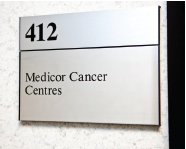 Bridging the gap… Time, evolving clinical research, and an explosion in practitioners of integrative medicine have set the process well on its way. Finding a clinic offering MD and ND services under the same roof, and more importantly having the professionals work as a team, was a rare site 20 or more years ago, even as early as 10 years ago. Such relationships are being created at an exponential rate today. IHP is privileged to be able to present these benchmark initiatives. We look forward to the day when an MD solo practice is the rare exception. The benefit to patient outcomes achieved by the combination of skillsets is undeniable. We congratulate Dr Khan and others for pioneering a new era of healthcare in Canada.
Bridging the gap… Time, evolving clinical research, and an explosion in practitioners of integrative medicine have set the process well on its way. Finding a clinic offering MD and ND services under the same roof, and more importantly having the professionals work as a team, was a rare site 20 or more years ago, even as early as 10 years ago. Such relationships are being created at an exponential rate today. IHP is privileged to be able to present these benchmark initiatives. We look forward to the day when an MD solo practice is the rare exception. The benefit to patient outcomes achieved by the combination of skillsets is undeniable. We congratulate Dr Khan and others for pioneering a new era of healthcare in Canada.
